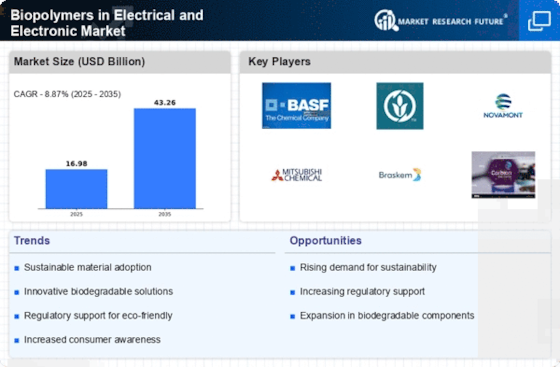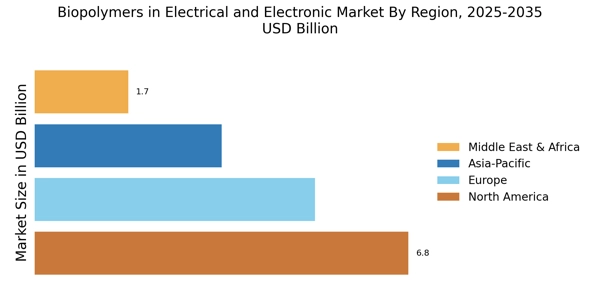Regulatory Support
Regulatory frameworks are increasingly favoring the use of biopolymers in the Biopolymers In Electrical Electronic Market. Governments worldwide are implementing policies that encourage the adoption of sustainable materials, including biopolymers. These regulations often include incentives for manufacturers who utilize eco-friendly materials in their products. For example, certain regions have established standards that require a minimum percentage of biobased content in electronic devices. This regulatory support not only drives demand for biopolymers but also fosters innovation within the industry. As manufacturers strive to comply with these regulations, they are likely to invest in biopolymer research and development, further propelling market growth. The alignment of regulatory policies with sustainability goals suggests a favorable environment for biopolymer adoption in electronics.
Cost Competitiveness
The cost competitiveness of biopolymers is becoming a crucial driver in the Biopolymers In Electrical Electronic Market. As production technologies advance, the cost of biopolymer manufacturing is decreasing, making them more accessible to manufacturers. This trend is particularly relevant as companies seek to balance sustainability with economic viability. Market data suggests that the price of biopolymers could decrease by up to 30% over the next few years due to improved production efficiencies. This reduction in cost is likely to encourage more manufacturers to adopt biopolymers in their products, thereby expanding their market share. The potential for biopolymers to offer a cost-effective alternative to traditional materials could significantly influence purchasing decisions in the electronics industry.
Technological Innovations
Technological advancements play a pivotal role in shaping the Biopolymers In Electrical Electronic Market. Innovations in material science have led to the development of high-performance biopolymers that can compete with traditional plastics. For instance, advancements in processing techniques have improved the mechanical properties of biopolymers, making them suitable for various electronic applications. The market is witnessing a surge in the adoption of biopolymers in components such as casings, connectors, and insulation materials. This trend is supported by a market analysis indicating that biopolymer usage in electronics could reach 20% of the total polymer market by 2028. As technology continues to evolve, the potential for biopolymers to replace conventional materials in electronics appears promising.
Sustainability Initiatives
The increasing emphasis on sustainability within the Biopolymers In Electrical Electronic Market is driving demand for eco-friendly materials. As industries seek to reduce their carbon footprint, biopolymers, derived from renewable resources, are gaining traction. This shift is evidenced by a projected growth rate of approximately 15% in the biopolymer sector over the next five years. Companies are increasingly adopting biopolymers to meet regulatory requirements and consumer expectations for sustainable products. The integration of biopolymers not only enhances the environmental profile of electronic products but also aligns with corporate social responsibility initiatives. As a result, manufacturers are investing in research and development to innovate biopolymer applications, thereby expanding their market presence and contributing to a more sustainable future.
Consumer Demand for Eco-Friendly Products
Consumer preferences are shifting towards eco-friendly products, significantly impacting the Biopolymers In Electrical Electronic Market. As awareness of environmental issues grows, consumers are increasingly seeking products that are sustainable and biodegradable. This trend is reflected in Market Research Future indicating that over 60% of consumers are willing to pay a premium for environmentally friendly electronics. Manufacturers are responding to this demand by incorporating biopolymers into their product lines, thereby enhancing their market appeal. The rise in consumer demand for sustainable options is prompting companies to rethink their material choices, leading to a broader acceptance of biopolymers in the electronics sector. This shift not only benefits the environment but also positions companies favorably in a competitive market.


















